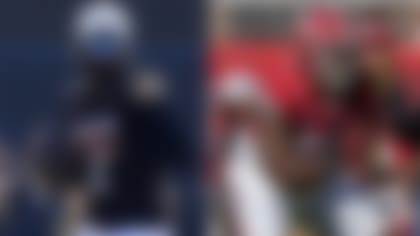As the calendar reaches the middle of February, front-office executives from several teams are furiously putting together plans to deal with their quarterback quandaries.
While some of those dilemmas involve the impending departures of legendary signal callers, others are faced with the difficult task of identifying the right quarterback to lead their respective franchises right now. Given the difficulty in finding elite quarterbacks, the decisions made by these astute football minds will ultimately determine the fate of their franchises for years to come.
Brad Childress understands the value of having a big-time quarterback in the huddle, as he ardently pursued Brett Favre last offseason. Though he didn't land the 19-year veteran until the beginning of training camp, there is no disputing the impact that the future Hall of Famer made on the Vikings offense in 2009.
Minnesota finished as the league's fifth-best offense under Favre's guidance after ranking only 17th in total offense in 2008. The Vikings' vastly improved aerial attack resulted in the team scoring an impressive 29.4 points per game, and fueled their run to the NFC Championship Game. With that kind of success in Favre's only year running the team, it is not surprising that Childress is willing to wait on the indecisive veteran to make up his mind regarding his return to pro football.
Although the Vikings are set to proceed with Tarvaris Jackson or Sage Rosenfels as their starting quarterback, the fact that the team was willing to add Favre on the eve of the season last year indicates the lack of confidence Childress had in either signal caller. That also is why the Vikings have a reported interest in Donovan McNabb if Favre elects to retire.
The Cardinals are another franchise faced with the prospect of picking up the pieces at the quarterback position based on the decision of a legendary signal caller. Kurt Warner's retirement has given long-time understudy Matt Leinart the keys to one of the league's most explosive offenses.
Unfortunately, Leinart has shown little promise when given opportunities in the past, and his inconsistent play has led Ken Whisenhunt to explore other options at the position. While Leinart is penciled in to be the Cardinals' starter, a veteran backup or a high draft choice will surely be brought in to compete with the fifth-year pro during training camp.
With Warner deciding to step away from the game immediately following season's end, the Cardinals have ample time to contemplate the possibilities at the position, and enact a plan that ensures the team remains among the NFC's elite in the foreseeable future.
The presence of McNabb, former Pro Bowler Michael Vick, and the promising Kevin Kolb has given the team the flexibility to move one of its highly regarded quarterbacks in exchange for multiple picks in this year's draft. With a roster that needs some tweaking at a few key positions, the additional selections could boost the Eagles to the top of the NFC.
Interestingly, when looking at the Eagles' quarterbacks most likely to be moved, it is McNabb and Vick who have dominated the trade conversation.
Vick, who enters the final year of his contract with a $5.3 million salary, was expected to be a key figure in the offseason movement from the day he arrived in Philadelphia. While his detractors would suggest he didn't play enough for teams to fully evaluate his talent after a two-year absence, his flashes of play-making ability in limited action have several teams contemplating pulling the trigger on a trade for the seventh-year pro.
McNabb, who also enters the final year of his deal, has routinely found his name attached to trade rumors despite enjoying unparalleled success as the Eagles' signal caller. Fans have grown weary of the team falling short in big games, and the murmurs are growing for Andy Reid to replace the five-time Pro Bowler in favor of Kolb.
Though Reid has been steadfast in his support of McNabb, he may be inclined to move his franchise quarterback if he receives a deal that is simply too good to be true.
While the Eagles could be looking to shed some of their assets at the position, teams like the St. Louis Rams, Washington Redskins, Cleveland Browns and Buffalo Bills are attempting to find solutions to their problems at the position.
In a quarterback-driven league, it is not surprising that each of the aforementioned franchises find themselves selecting within the first 10 spots of the draft based in part on the dismal performances of their signal callers last year.
Though each has the option to remain status quo at the position while building up the talent around their current quarterback, the opportunity to find an upgrade through free agency, a trade or the draft presents a viable alternative.
Free agency, however, offers few intriguing possibilities, so general managers must choose between trading for an established veteran or taking a gamble on one of the draft hopefuls set to enter the league.
In most years, that possibility would excite front-office executives, but this year's quarterback class features numerous question marks at the top. Sam Bradford and Jimmy Clausen will not work out at the NFL Scouting Combine due to injuries, and their medical status could impact their standing in eyes of evaluators. Given the question marks that surrounded Bradford and Clausen prior to their injuries, teams have to decide if the risk is ultimately worth the reward.
Earlier this month, the Super Bowl reminded us of the importance of having a big-time quarterback on the field, as Drew Brees and Peyton Manning stole the show. With that in mind, the pressure is on several general managers this offseason to make a move to acquire a franchise player.




